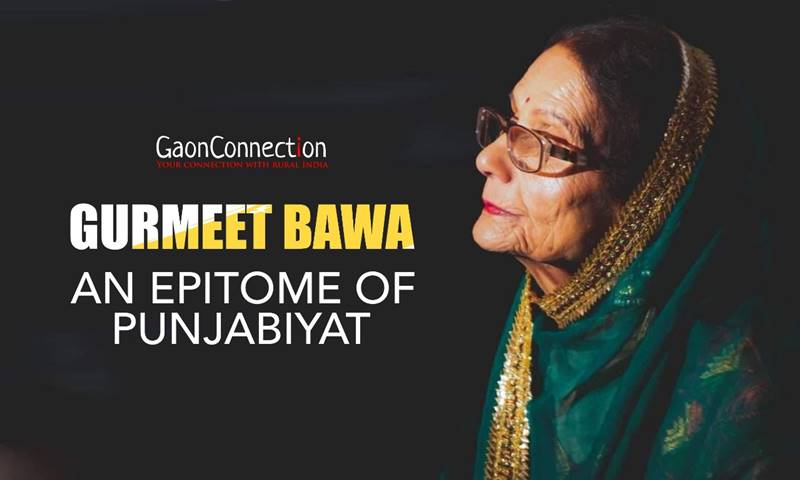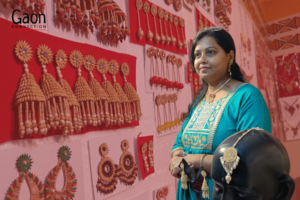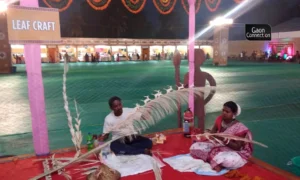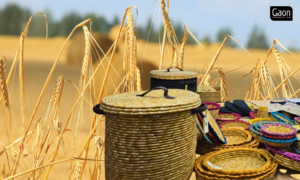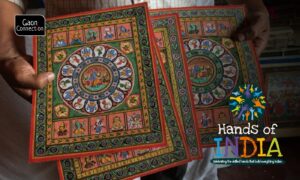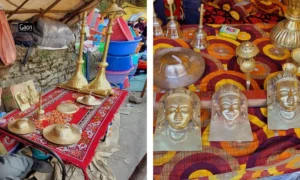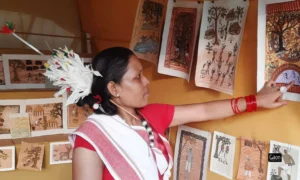Anyone who heard Gurmeet Bawa sing Kaharo Doli Na Chayo Aje Mera Babul Aya Ni, could not walk away unmoved. When she sang of the heartbreak of a daughter leaving her home after marriage, it never failed to bring tears to those who heard her sing. Jugni, tappe, the energetic boliyan, and songs woven around folk romances such as Heer Ranjha and Sohni Mahiwal and Mirza Sahiban –– the folk singer immortalised Punjabi folklore through her singing.
Gurmeet Bawa, also known as lambi hek di malika, or the queen of the long note (she could hold a note for a full 45 seconds), drew her last breath on November 21, 2021. This year, on January 26 on Republic Day, the Punjabi folk singer was posthumously awarded Padma Bhushan.
“I am sure my mother would have cherished it had she been alive today,” Glory Bawa, her daughter, told Gaon Connection. The award was in recognition for her contribution in preserving and popularising Punjab’s rich folk music tradition.
According to Glory, her mother never got tired of saying that if people forget their folk culture, they are but just bodies without souls. “She believed that folklore represents our collective wisdom. It is an oral history of how a community has behaved, excelled and survived for centuries,” said Glory who said she could not be a prouder daughter of a mother who despite obstacles, chose to go down a difficult path and revived Punjabi folklore through her singing.
‘Folklore came naturally to Gurmeet Bawa’
Like the songs she sang, Bawa was also intrinsically linked to rural Punjab where she grew up in an agrarian family. She was born in 1944 at Kothe village in Gurdaspur district. Folklore came naturally to her. She grew up listening to folktales and songs that were sung on every occasion in the village, be it for a wedding or a funeral. These were songs and stories that were passed down from one generation to another.
Her daughter, Glory Bawa, also a Punjabi folk singer, recalled stories her mother told her of growing up in rural Punjab and how it was unthinkable then for girls to go out by themselves let alone sing professionally.
“Several relatives snapped ties with my grandfather because he allowed my mother to pursue her studies,” Glory told Gaon Connection.
Also Read: The Dangi Dance of Adivasis in Gujarat celebrates Mother Earth
Gurmeet Bawa was first woman in her family to pass her matriculation and then a junior basic teaching (JBT) course which led to her teaching job in a government school.
Music began to figure seriously in Gurmeet’s life after her marriage to Kirpal Bawa, a government teacher, in the mid 1960s. As the story goes, when Kirpal heard his wife sing he realised her voice was just perfect for folk songs. Soon, Gurmeet got her first major break as a folk singer in the local Akashwani radio station in Amritsar. She also became the first female artiste from Punjab to be empanelled by Doordarshan when it started in Jalandhar in the early 70s.
She sang across the world in over 30 countries, and was a favourite artiste when it came to offshore cultural performances.
Folklore in songs
Ravjot Kaur who did her PhD on Gurmeet Bawa, said that she had sung 12 different versions of the folktale of Mirza, the only artist to do so. According to Ravjit Kaur, Gurmeet Bawa travelled in rural Punjab, collecting folklore and then setting them to music. “Gurmeet Bawa in fact was the only folklore singer in Punjab who did not use western instruments in any of her performances,” Ravjot told Gaon Connection.
Till her last performance she sang to the dhol, tumbi, gharha, chimta, and algoze, all of them folk instruments.
“My mother was not against westernisation of Punjabi music. With so many Punjabis settled abroad, the influence of western culture on Punjabi music had to come in one form or another, she would always say,” said Glory Bawa. “But she wanted the young generation to stay connected to their roots as well and never to forget it.”
Gurmeet Bawa has been awarded the Rashtrapati Puraskar by the Sangeet Natak Akademi, Devi Ahilya Award by the Madhya Pradesh government and the Shiromani Gayika Award by the Punjabi language division.
Also Read: A qawwali to quit alcohol
Preserving the legacy of Gurmeet Bawa
“Her death is the end of an era in Punjab. She was the last famous Punjabi folk singer and it is imperative that her legacy is preserved,” Kewal Dhaliwal, a noted theatrist and chairperson of the Punjab Sangeet Natak Akademi, told Gaon Connection.
He suggested that the universities in Punjab set up a Gurmeet Bawa Chair for research on her body of work that spans for more than half a century. He hoped the state government would take this up.
He concluded by saying that Gurmeet Bawa represented Punjab and Punjabiyat as few others did.

